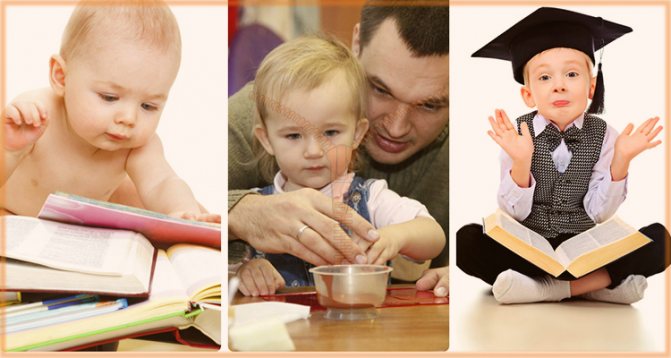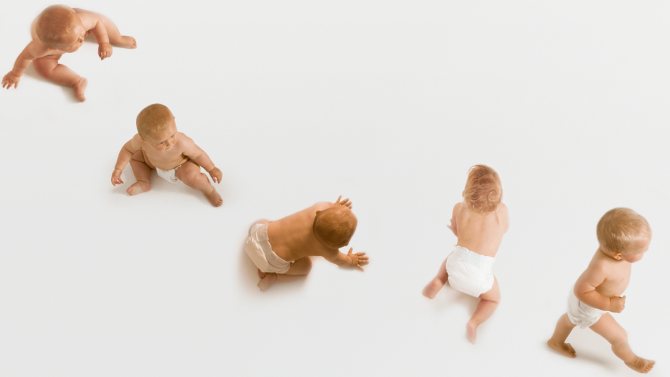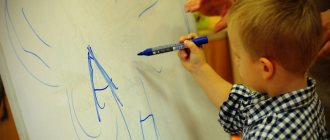Early childhood development is one of the main goals of the World Health Organization. According to the Lancet, which published data on this issue, approximately two hundred million children under 5 years of age in developing countries do not have the opportunity to realize their potential. As a result, such children fall behind in their learning. The WHO commission, which deals with this problem, noted the importance of early education of a child for the formation of justice, health, well-being and productivity in adulthood.
The nervous system and its role in child development
The baby’s nervous system regulates the vital functions of the small organism, ensuring the coordinated functioning of the whole organism. Its main function is the integration and regulation of various processes in connection with changes in the internal and environmental conditions of the baby. The improvement of the nervous system is gradual. In pediatrics, there are different periods. Each of these periods is characterized by its own characteristics. There are certain criteria for the formation of a baby in each period, which make it possible to distinguish between normal and pathological conditions.
Ways to stimulate intelligence in case of developmental delays
The development of intelligence up to one year can be fraught with difficulties if the baby is slow to learn and has little interest in the world around him or does not show curiosity. Typically, slow mental development is associated with damage to the central nervous system and an underdeveloped cerebral cortex. This diagnosis is made by neurologists and special treatment is prescribed.
It is necessary to monitor the child’s development and if there is a lag in mental and physical processes - then sit, walk, talk, contact specialists for consultation. Everything can be corrected if timely measures are taken. If a child behaves passively, has little interest in toys, and does not develop a “revival complex” when adults appear, then these are alarming signs.
Such children are inactive, have difficulty making contact with strangers (friends, guests), and lag behind in the transition to a sign form of communication and cooperation with adults. Grasping abilities are less developed, sounds appear later - humming and pre-speech development is delayed. All this affects mental development.
The development of intelligence up to one year for children with developmental delays is carried out according to special programs at neurological clinics and other medical institutions. Such programs include a set of activities - impact on physical and mental development through electric current procedures, massage (when sitting or walking is delayed), classes with a speech therapist to stimulate speech, therapeutic exercises to strengthen muscles, classes with a psychologist according to the Montesori system (development of motor skills with the help of special toys), development-stimulating drugs may also be prescribed.
There are situations when a child begins to walk confidently around the age of 2, after undergoing a course of massage, and speech appears after three years after intensive training with a speech therapist. If you have symptoms of developmental delay, you should not give up, but look for specialists who will help in these matters.
There are 2 extremes - some parents believe that everything will work out and should go as usual, others worry too much and play it safe. Yes, there are minor deviations from the norm, but it is not advisable to consult with neurologists if there are suspicions regarding the timing of development. The sooner you start procedures to stimulate development, the better; it’s difficult to get back time.
Basic recommendations for parents
- Be patient and take measures to stimulate development;
- Constantly communicate with the child, try to arouse interest in the world around him;
- If you have problems with speech, look for good speech therapists, they can not only make sounds, but also help you talk;
- Engaging with your child in games that develop motor skills - pyramids, cubes, modeling, it is very important to do something with your hands, there is a direct relationship between the development of motor skills and the development of the brain;
- Swimming and a pool are recommended for comprehensive development; now there are special groups for children accompanied by their mothers. Swimming stimulates sensations, strengthens muscles and motor activity;
- Regularly see a good specialist (neurologist), he will help monitor the development process, give tips, advice, and conduct the necessary examinations.
An important point - children with damage to the central nervous system may have very poor sleep, this is also a sign of disorders in the body, you should not suffer from constant lack of sleep, it is better to ask a question to specialists - to help yourself and the child. In this case, doctors are our friends, and recognizing the need for help can significantly improve the situation.
As we understand, the development of intelligence up to one year is a necessary and important stage; the earlier you start developing a child, the better the result will be. Perhaps some parents don’t even realize that by playing and reading they develop the child’s intelligence, while others are looking for special techniques and games. Everything is good as a whole, with the human factor coming first. Only parents can teach a child the necessary things, open a beautiful and amazing world for their child!
I wish everyone success in the development of their children! Everyone has talents, you just need to notice and help!
What is early child development
Early development is the natural improvement of a child between the ages of 1 and 3 years. This term can be interpreted in another way. For example, when using this term, parents mean the child’s accelerated learning in relation to his peers. We will consider this concept from the point of view of pediatrics. In pediatrics, there is the concept of neuropsychic development, which includes the psychomotor and speech education of the baby. Complex names that are quite easy to understand. These terms are inextricably linked with the early formation of skills and psyche. Therefore, further consideration of the topic will be inextricably linked with these concepts.
Early development is the natural improvement of a child between the ages of 1 and 3 years.
Basic methods for developing intelligence at an early age
The development of intelligence up to one year is the first and most important period for preparing a child to perceive knowledge and skills.

The system for developing a child’s intelligence is built on key points
- A baby has the opportunity to explore the world if the environment around him is diverse and provides a lot of useful information.
- The baby is in constant contact with his mother, close people - they communicate with him, play finger games (“thief magpie”, “goat” and others), you can also “over bumps”, “horse”. Children love attention from adults and usually express joy from communication. Children enjoy playing with adults and games such as “peek-a-boo” (hiding behind their hands), hide and seek.
- Children listen to fairy tales, poems, funny stories for younger children. Interestingly, even young children can memorize stories and later play role-playing games with toys with the help of adults.
- Children develop musically by listening to classical melodies (Mozart is especially useful), and it is also useful to hum children's songs and lullabies. This contributes to the development of hearing, and musical abilities may not appear immediately, but after years.
- The development of intelligence up to a year is successful with the development of motor skills - now there are special games (wooden pyramids of various shapes, balls that can be moved along a rod), modeling is also useful, colored dough is recommended for the little ones, although it is better to do modeling together with their parents. You can sort through the cereal or pour different objects into the bag so that you can try to feel what is there by touch.
- Sensory sense is the development of the ability to sense the world, it is useful to play in ball pools, to pick up objects of different textures, you can use pieces of fabric (they even make selections of such scraps for games), the child’s development is largely due to tactile perception.
- Outdoor games - exercises for the little ones, a bicycle, flexion and extension of arms and legs, training of grasping reflexes. All this is necessary for the future successful development of the child.
- Colorful books with pictures also help develop intelligence, however, you need to help the child understand who is depicted in the pictures - people, animals, phenomena. Children initially receive all information from their parents. Electronic learning tools cannot fully replace a person; they only allow you to occupy the child’s attention for a while.
- After 6 months, communication with adults is more of a business nature, not just emotional. The baby strives to explore the world and asks for help from loved ones - to show it, to get it. It is necessary, as far as safety is concerned, to provide the child with information to master the objects of the surrounding world. You can leave books and pots on the lower shelves that you can study. And put medicines, cosmetics and other things that are undesirable for the child away.
- Joint games, after six months the baby himself encourages the adult to do similar activities - holds out toys, points to his favorite ones, it is important to give information - how to play, the purpose of objects, methods of use. All this is necessary for further successful development.

- The development of intelligence up to one year is successful if there are prerequisites for communication - in the second half of the year the baby’s social circle expands, it is necessary for him to come into contact with different people - grandparents, friends, godfathers. At the same time, children adapt to different behavior patterns, tune in to the wave of communication, recognizing the characteristics and preferences of others. At this stage, the foundations for successful communication in the future are laid. It is important to learn to cooperate with other people in time.
- Knowledge of the world and the development of a baby are largely determined by his emotional state, the presence of support, confidence, and helps to cope with difficult situations, new tasks, and games.
- Memory development - memory training is carried out through special memory games. For example, we hide objects, check how the child remembers which hand holds the required “bunny or bear”. In this way, visual memory is trained, and the child tends to remember things based on emotions; if something is connected with a game, pleasant memories, then he will recognize it better.
- Allow your baby to experience the world in different ways - by touch, smell, taste. If you want to try everything on your teeth during special periods when teeth are cutting, it is better to find toys that are suitable for this, special teeth pickers.
- It is important that toys are of different shapes, colors, convenient for play and help development. Always show by example how to play correctly, teach how to rotate the wheels, disassemble the nesting dolls, and fold the houses.
- The development of intelligence up to one year is possible if you monitor the child, his interests, and use them for educational games. Water toys for useful time in the bathroom, special paints, construction sets and cut fruits for understanding the whole and parts will help. During the development of a child, you can use both fashionable toys and surrounding objects, because they always arouse great interest. Everything that adults use is also necessary for a child; you can give safe objects - spoons, pots and more.
So, the successful development of intelligence in infants is possible in the presence of the following factors: the support and love of loved ones, space to explore the world, manifestations of creative imagination, joint games and a variety of environments. The task of parents is to help their child explore the world, tell, show, explain, preferably in a playful way. Communication is indispensable for the formation of speech, and reading is indispensable for literacy.
Assessment of psychomotor and speech development of infants and toddlers (developmental assessment)
In essence, the emergence of a particular skill in a baby is the formation of an acquired reflex. And it can be formed only after the brain structure responsible for this reflex has matured. No structure - no skill. That is why pediatricians can assess the degree of maturation of various parts of the brain by the presence or absence of relevant skills.

The emergence of a particular skill in a baby is the formation of an acquired reflex.
You can evaluate the psychomotor and speech education of a baby at home. To do this, we present below the main points when assessing psychomotor and speech education, and also indicate the average time for the appearance of a particular skill in healthy children:
Motor - static:
- Holds head (2 months);
- Rolling onto the stomach from a supine position (4-5 months);
- Rolling onto your back from a prone position (5-6 months);
- Sitting (6 months);
- Crawling (7-8 months);
- Standing with support (8-9 months);
- Stands on its own (10-11 months);
- Walks with hand support (10-11 months);
- Walks on his own (12 months).
Purposeful motor activity:
- Grasping an object and simple manipulations with it (5-6 months);
- Shifting an object in one's hands, reaching out to loved ones, clapping one's hands (7-8 months);
- Plays primitively (9-10 months);
- Various activities with toys, contact with peers (11-12 months).
Visual analyzer:
- Fixes the gaze (2 weeks);
- Watches for shiny, colorful toys (3 weeks);
- Carefully examines various objects, toys (4-5 months);
- Recognizes relatives and familiar faces (6-7 months);
- Observes parents, reacts to facial expressions (9-10 months);
- Recognizes many objects from pictures (11-12 months).
Hearing analyzer:
- Positive reaction to the voice of loved ones (2-3 months);
- Recognition and response to the voices of loved ones, reactions to voice intonations (4-6 months);
- Understanding speech addressed to him (9 months);
- Following fairly simple verbal instructions (10 months).
Speech:
- Walking – pronouncing vowels (2 months);
- Flute – pronouncing different sounds with different tonality (4 months);
- Pronunciation of syllables - babble (7-8 months);
- Pronunciation of words (9-10 months);
- Linking several words into phrases (18-20 months);
- Verbose phrases (3 years);
- Long phrases, monologues (4-5 years).

Using these methods, the pediatrician evaluates development.
This is how a pediatrician evaluates development. Communicating with parents, he finds out at what age certain skills appeared. The survey of parents is carried out according to the specified scheme. In this way, it becomes clear how the baby was improving until the moment of examination. During the examination, the doctor evaluates what the patient can do. Then, based on the data obtained during a survey of parents and examination of the baby, the doctor assesses the development of the baby at the time of examination. Educational assessment is carried out within certain epicrisis periods:
- Monthly during the first year of life.
- From 1 year to 3 years with an interval of 3 months.
- From 3 to 7 years with an interval of 6 months.
- Over 7 years old at 1 year intervals.
Early childhood development
Gulbivi Lebedeva
Early childhood development
Early development .
One of the obvious trends in raising young children in the last decade has been the fashion for early development . developing their child purposefully, systematically and as early as possible , starting from 2-3 years old, or even earlier. This is largely due to the state of the modern educational market. Currently, there are many new early development , pre-gymnasiums, schools for children, specialized kindergartens, etc. More and more methods are appearing, the authors of which promise parents to develop attention, memory, logical thinking in younger preschoolers, teach them to read and count, Moreover, very quickly and very early. This, in particular, is evidenced by the very names of some methods: “Read before walking”
,
“Thinking before you talk,”
etc. Most toys and aids, which are called
“
developmental ” are sets for introducing new information and training any skills.
This can only indicate that the development of a child, from the point of view of parents and toy manufacturers, is understood solely as expanding his horizons and mastering primary skills, and ultimately comes down to the child’s education and accumulation of various knowledge. Fully trusting the authors of such publications, parents buy these teaching aids for their child, sit him in front of them and “
develop ” him .
At best, such assimilation of information can be called learning. But what about early development ?
Development , according to the philosophical definition of this concept, is always the emergence of a new quality, the emergence of something qualitatively new. When applied to child development , it means the emergence of a new attitude towards the world and towards other people, new abilities, new desires, interests, motives and motivations for action. All this is always reflected and expressed in children’s initiative and independence, when the child himself comes up with something, creates something, and strives for something. Actions dictated by an adult, as well as answers to his questions (even correct ones, have nothing to do with the child’s development . On the contrary, they can become a brake on such development , since following the tasks and instructions of an adult deprives the baby of his own activity. According to recent research, children from an early age focused on learning and “early development ”
, turned out to be less creative, less self-confident, more anxious and tense.
The achievements of preschoolers in specific knowledge and skills (such as the ability to read and knowledge of numbers)
are very quickly lost and do not provide any advantages in mental
development and future mastery of the school curriculum. The main problem in teaching young children is that the knowledge and skills that adults try to put (and sometimes successfully put)
into their heads have no place in children's lives.
For a child, all this is formal, alien and unnecessary exercises in his life. The baby cannot feel free, active and independent when he is being taught. Therefore, this kind of “early
development ” not only does not contribute, but also hinders the actual
development of the child’s personality . Educators notice that many preschoolers who have gone through development
school ” using one method or another become nervous, anxious, non-communicative, and do not perceive the surrounding reality.
Now we are increasingly faced with cases of “alienated knowledge”
in young
children . For example, a three-year-old child who has learned to read and amazes adults with the speed of reading, understands absolutely nothing about what he is reading, and cannot even approximately say what he just so quickly read about. For him, reading is just a mechanical skill. This skill has nothing to do with his desire to read, with his love of books. On the contrary, most likely, such a child will avoid activities that are alien to him, meaningless. about any development .
And yet to develop a preschooler. developmental path that a child goes through during the preschool years is enormous. During this time, he acquires, perhaps, more than in his entire subsequent life. It is in preschool age that the
a person with his unique character, attitude towards himself and towards other people, with his needs and abilities.
But all this is formed and developed not in educational activities, but in the child’s own activities.
Psychology has long shown that development occurs in his activities. Moreover, activity is not only behavior (what a person does with his hands and feet, but also ideas, desires, experiences associated with some object. By creating, inventing, remaking something, a person builds, creates, transforms not only the surrounding objects, but also oneself. Each age is characterized by its own specific activity, which leads to development , it is called leading. In infancy, the activity is communication with an adult, in early age (from 1 year to 3 years)
- actions with objects; in preschool age, play becomes the leading activity.
Play is a unique means of non-violent education and development of preschool children . It corresponds to the natural needs and desires of the child. In the game, children can do things that they cannot yet do in real life: they come up with exciting stories, share toys with each other, follow the rules, wait their turn, show patience and perseverance. And most importantly, all this happens freely and voluntarily, without pressure or coercion from an adult.
This, however, does not mean at all that adults should not interfere in children's play and teach the child to play. Even the most useful toys themselves cannot tell or show how to play with them. A child can endlessly repeat the same primitive actions, which is unlikely to develop .
Those who already know how to play and know interesting games can teach a child to play. For many decades, such “teachers”
there were older children, and everything happened spontaneously, naturally, without any adult intervention.
Now this connection between children's generations has been broken. So such a child grows up among adults who have their own problems and who have no time for games. And from the parents the child hears only “new information”
, notations and calls to be focused, attentive, independent, etc.
But a child can acquire all these valuable qualities only in joint activities with an adult, and not when he is taught. We must understand that by depriving a small child of joint play with an adult, forcing him to prepare for school and study ahead of time, we not only rob him of his happiest age, steal the whole world of childhood experiences, aspirations, relationships, but also rob him of the opportunity to become a full-fledged person in the future.
The path based on the full experience of childhood is much more complex and difficult than the path of accelerated development .
We hope that our articles will allow you to take a fresh look at your child.
It is good to know, understand and feel the child’s capabilities, his childhood desires, preferences, states - in a word, his child’s psychology,
Other methods for studying the level of development of young children
It is worth noting that the above-described method of assessing training is screening (quick, superficial). It allows you to examine a large number of children at once. If learning disabilities are identified, the patient needs a more in-depth examination and consultation with specialists such as a neurologist, psychologist, etc.
Along with this technique, in 2006 the World Health Organization proposed the use of the so-called “Windows of Achievement for 6 stages of motor development.” The disadvantage of this technique is that the level of speech formation, emotional and sensory formation of the baby is not taken into account and ignored. There are other methods that allow you to assess psychomotor education. One of the promising foreign methods is the Griffiths Mental Development Scale. Centile graphs, which are quite easy to use, have also become widely used for assessing learning.
Child development delay
Early education of a child is gaining enormous popularity from the point of view of early development and acquisition of certain skills that are ahead of the age of a child prodigy. Parents try to impose early childhood education methods on their children, without thinking about the problems associated with advancing children's early education. But few people think about what number and what percentage are those children who are lagging behind in education.

Parents try to impose early childhood education methods on their children, without thinking about the problems associated with advancing children's early education.
If a child is behind in education by one epicrisis period, then this is considered a variant of the norm. A delay in education up to 2 epicrisis periods is regarded as developmental delay . If there is a delay of 2 to 3 epicrisis periods, this condition is regarded as a developmental delay. In more severe cases, a profound developmental delay , when the deviation is more than 3 epicrisis periods.
It is worth noting that the baby will not necessarily have deviations in all areas of education . At the same time, he may have a delay in speech formation against the background of normal motor learning. If a child has a severe pathology and has deviations in almost all areas of learning, then in this case the term “delayed neuropsychic development” . In the case of a combination of delayed neuropsychic development and delayed physical development, the diagnosis “delay of all types of development” is valid.
Psychomotor and speech development are one of the main indicators characterizing the baby’s health status. Despite the fact that each person is unique and inimitable in his own way, there are general criteria that characterize the level of education of a child. It is during early childhood that the final formation of individual brain structures, the formation of the auditory and visual analyzers, occurs. Therefore, it is during early childhood that the pediatrician intensively and carefully examines the level of the child’s neuropsychic education. It is worth noting that the cognitive development of a child in early childhood has enormous plasticity and is subject to pronounced influence from the environment. The main task of parents is to provide favorable conditions and create an atmosphere that will allow the child to develop according to his age abilities.
Development of intelligence in children from 9 to 12 months
Closer to one year old, the child is already able to distinguish objects by their qualities or properties. Of course, all this is just the beginning of abstract thinking, but the child is already able to distinguish animals (and even if for him all those with a tail are called by the single word “kisya,” but this is a significant process in perception), relatives and friends, he knows up to about 10 -ty words and uses them skillfully and correctly.
At this stage of life, allow him to use even those things that you may think are difficult for him. If a child cries at the sight of cartoons, but freezes during the movie, it means that he likes it, and this is precisely his development; you should not slow him down just because the child is not yet mature enough.









